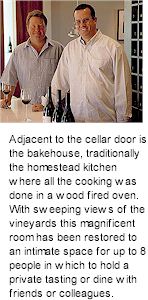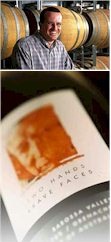


Michael came to the wine industry from a construction background having spent years attending wine tastings and collecting the wines of the world. In 1998, he established his own Australian wine export company and after three successful years of selling other people's wine, he and business partner Richard Mintz decided to start their own operation.

From day one, Michael's role has been multi-faceted. He heads up the marketing side of things and is constantly nutting out new ways to keep the ideas fresh. He is eagerly involved in all aspects of the production process and has successfully overseen the construction of the new Two Hands cellar door and winery in the Barossa Valley at Neldner Road, Marananga.
Richard was a disenchanted chartered accountant by training with an M.B.A. from Adelaide University whose passion for wine started when he was appointed Chief Executive of one of Australia's leading cooperages. In early 2003, Richard left the cooperage to devote himself wholly to Two Hands Wines. He is active in all areas of the business from handling many of our long term projects to supporting international distributors, liaising with growers and even getting his 'two hands' dirty during vintage.
In 2000 they started with just 17 tonnes of fruit from the McLaren Vale and Padthaway wine regions. The heart of the operation is still Barossa Valley based, the cellar door and winery are located in the sub district of Marananga. Opened in December 2003 the cellar door has already come to be regarded as one of the highlights of the region with its contemporary interior design and commitment to providing guests with an educational and personal wine experience. The Marananga winery was officially opened in November 2004, designed specifically for small batch production of the very best parcels of fruit.

The Two Hands are innovative and not afraid to think outside the square as there are many different steps and countless hours involved, from vineyard, through to winemaking, tasting, blending and maturation in order to make consistent, quality wines. The Two Hands winemakers concentrate their efforts on sourcing the best fruit from the best Shiraz vineyards in Australia, working closely with growers on achieving the full potential of each individual site.
Quality, without compromise is central to the Two Hands philosophy, driving all the decisions from fruit and oak selection to packaging and promotion. Two Hands seek to differentiate ourselves, to be unique, fun and innovative while maintaining a high degree of professionalism and integrity.
This is achieved by sourcing the best parcels of fruit available from six prime regions within Australia. Every parcel of fruit is handled separately, no matter how small, from crushing through to fermentation and oak maturation to ensure complexity and personality in the finished wines. Two Hands allow fruit to be the primary feature of all our wines with oak playing a supporting role.

























